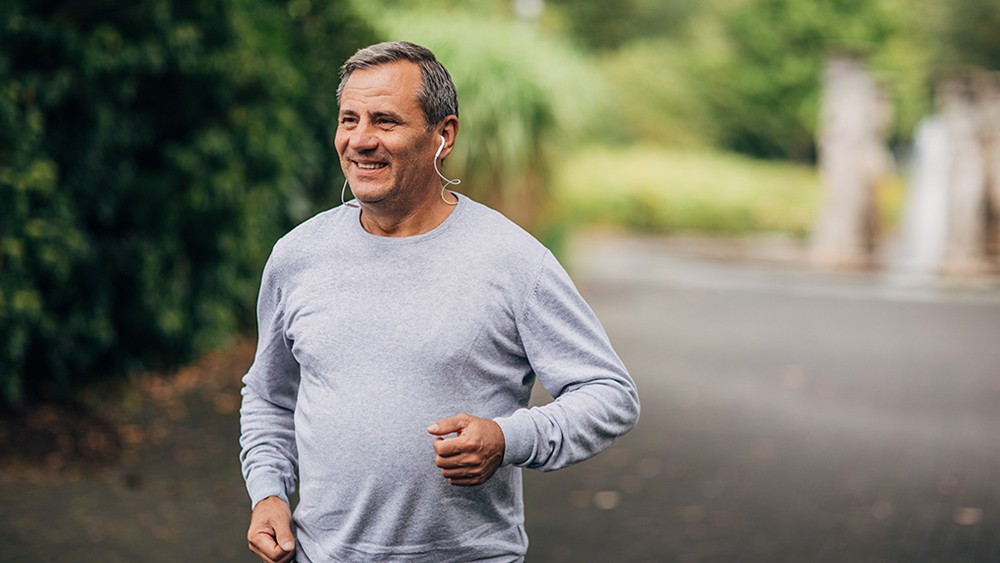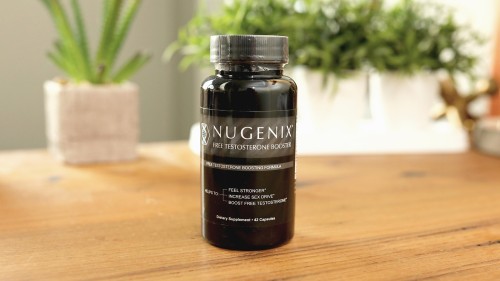TestoGen Review: Is It Safe and Effective?
Last Updated on November 17, 2021
Medically Reviewed by Anthony Dugarte, MD
While TestoGen does contain some ingredients that may increase testosterone levels, they don’t appear to be in adequate amounts to make a difference.


|
Pros
|
Cons
|
What Is TestoGen?
TestoGen is a testosterone booster that claims to increase muscle size and strength as well as boost libido and sexual performance. This product is designed for men 18 years and older.
The manufacturer claims that taking TestoGen will help to naturally increase your testosterone levels in your body without having to take testosterone itself.
As men age, testosterone levels naturally decline. This can lead to reduced energy, decreased libido, and muscle loss. (1)
While many of the ingredients in TestoGen are considered natural and shown to have minimal side effects, it is unclear if they actually work in the present doses.
It’s also important to keep in mind that “natural” doesn’t necessarily mean safe.
Three research studies are cited on the product website, but two out of the three are from over ten years ago and are very small. This leads me to believe there is no strong evidence to support product claims.
The dosage recommendation is four capsules once per day, 20 minutes before breakfast.
Evaluation of Ingredients
TestoGen contains eleven ingredients. For simplicity’s sake, I will list the top six core ingredients as the others are in very minimal amounts.
1. D-aspartic Acid, 2,352 mg
D-aspartic acid is a unique amino acid that helps to make and release hormones such as testosterone. Because of this, taking more of it is thought to potentially increase testosterone levels in the body.
There are some studies on D-aspartic acid and its potential to boost testosterone, but most of these studies are in animals. (2)
Human studies have shown inconsistent results. For example, one short-term clinical trial showed those taking D-aspartic acid had 42% higher testosterone levels on average. However, this study was only 12 days long. (3)
A longer study conducted over 90 days also showed higher testosterone levels (up to 30–60% higher) in those taking 2,660 mg of D-aspartic acid per day. (4)
The doses given in some studies were over 3,000 mg, which is higher than what is present in TestoGen.
Summary
D-aspartic acid has the potential to increase testosterone levels. However, more research is needed on the optimal dose to determine if the amount in TestoGen is enough.
2. Magnesium, 200 mg
Magnesium is a mineral that has many health benefits, including being a powerful antioxidant.
One study showed that magnesium might be involved in maintaining normal levels of anabolic hormones, such as testosterone. (5)
However, this study showed more of an association between magnesium and testosterone levels, meaning those who had lower magnesium levels tended to have low testosterone as well.
It’s rare to be magnesium deficient, and so it’s unclear if taking a magnesium supplement in the absence of a deficiency would offer any benefit.
In those that are magnesium deficient, taking it may help to bring testosterone levels closer to normal. (6)
Summary
Magnesium is an essential mineral that may be associated with healthy testosterone levels. However, it may not be necessary to take in supplement form unless you are deficient.
3. Vitamin D3, 50 mcg
Vitamin D3 is another essential nutrient involved in regulating hormone levels and overall health. Unfortunately, vitamin D deficiency is pretty common, which can affect many aspects of health. (7)
There is also a link seen between low vitamin D levels and low testosterone. (8)
One 2011 randomized trial showed that those taking a vitamin D supplement had higher testosterone levels than those who didn’t. (9)
However, the dose given was over 80 micrograms, higher than what is present in TestoGen.
Summary
Lower vitamin D levels have been associated with low testosterone levels. However, it’s unclear if the amount of vitamin D present in TestoGen is sufficient to correct an actual deficiency if you had one.
4. Nettle Leaf Extract, 40 mg
Nettle leaf extract, otherwise known as “stinging nettle,” is popular in Western herbal medicine. Some say it may help to increase free testosterone levels in the body.
A few studies have been done on nettle leaf and testosterone levels, but most have been small and mainly animal studies. (10)
Another small 2016 study was done on 20 male college athletes, which found those taking a multi-ingredient supplement containing stinging nettle had increased levels of free testosterone in the body. (11)
Summary
Nettle leaf extract may increase testosterone levels, as seen in small studies. However, more research is needed to determine its effectiveness and the optimal dose.
5. Korean Red Ginseng Extract, 40 mg
Korean red ginseng is a plant native to China that some say may help improve erectile dysfunction.
A 2018 systematic review shared many studies on Korean red ginseng helping to improve erectile dysfunction. It is said to do this by protecting the blood vessels in the penis from oxidative stress, enabling it to perform more optimally. (12)
Another 2009 randomized controlled trial was done involving 86 men. Those who took 1,000 mg of Korean red ginseng experienced improvements in erectile function and overall satisfaction. However, this dose is significantly higher than what is present in TestoGen. (13)
Summary
Korean red ginseng has been seen to improve erectile dysfunction. However, the dose in TestoGen may not be enough to produce any benefit.
6. Fenugreek Extract, 40 mg
Fenugreek is a medicinal herb native to India and South Africa. It is said to act as an antioxidant that may also naturally boost testosterone levels.
One small 2010 study found those taking 500 mg of fenugreek daily for eight weeks experienced a slight increase in testosterone levels, as well as improved strength and body fat percentages. (14)
Another 2017 12-week study showed that those taking 500 mg of fenugreek daily had improved testosterone levels. (15)
Both of these studies used a much higher dose than the 40 mg of Fenugreek present in TestoGen.
Summary
Fenugreek is an herb that may boost testosterone levels and body composition in men. However, the amount present in TestoGen is not a clinically effective dose; therefore, it’s unclear if it would offer any of these benefits.
Support for Claimed Benefits
Below is our summary of the available evidence for the claimed benefits of TestoGen based on the available research:
| Increase muscle size | 3/5 |
| Improve energy | 3/5 |
| Boost libido | 3/5 |
While some of the ingredients in TestoGen may support energy, libido, and muscle growth, most of the studies are small or in animals.
Therefore, it is difficult to draw definitive conclusions from this research to support the manufacturer’s claims.
Cost and Where to Buy
The price of TestoGen is pretty similar to other testosterone boosters on the market.
TestoGen costs $59.00 for a 30-day supply. You can also purchase a 3-month supply and get two additional months free.
This way, a 5-month supply costs $179, which saves close to $30 per month compared to ordering for just one month.
You can purchase TestoGen directly from the manufacturer or on Amazon for essentially the same price.
If you decide to purchase it, I suggest buying it from the company website to secure the 100-day money-back guarantee.
Side Effects, Safety, and Dosage
The dosage recommendation is four capsules once per day, 20 minutes before breakfast.
Overall, TestoGen has a pretty good safety profile, mainly because its ingredient doses are far below the tested levels in the research.
However, there are still a few potential side effects to note.
First, TestoGen contains magnesium, which may cause diarrhea, bloating, or nausea in some people.
However, this is typically more common with certain forms of magnesium, such as magnesium chloride, carbonate, or oxide. It is not clear which form is present in TestoGen. (16)
Second, ginseng has the potential to lower blood pressure, and therefore those on blood pressure medications should proceed with caution. (17)
Taking ginseng at the same time as your blood pressure medications may cause your blood pressure to drop too low.
It may also interact with diabetes or blood-thinning medications like coumadin. (18)
Before starting this product, speak to your medical doctor, especially if you take any prescription medications or have a pre-existing medical condition.
How TestoGen Compares to Alternatives
There are many testosterone boosters on the market, many with similar ingredients to TestoGen.
However, TestoGen is unique because it contains nettle leaf extract, which is not present in most other testosterone boosters I researched.
The ingredients seen in testosterone boosters can vary. However, common ingredients include D-aspartic acid, fenugreek, B-vitamins, amino acids, zinc, ginseng, berry extract, and longjack root.
Test Boost Max and TestoFuel are two other comparable testosterone boosters out there.
Test Boost Max is priced lower than TestoGen – $41 per month compared to $59. It contains ashwagandha and longjack root, two other ingredients that may increase testosterone.
However, the amount of these ingredients is lower than what has been shown to be effective in any studies.
TestoFuel is more costly at $65 per month and has similar efficacy and research to TestoGen. However, TestoFuel’s manufacturer is not as transparent in sharing their scientific team and who helped to create their products.
All in all, TestoGen is pretty comparable to other similar products in that there is not enough strong research to prove it works in the ingredient amounts present.
Based on the available research, most testosterone boosters do not seem to be widely effective in humans for improving testosterone levels.
Frequently Asked Questions About TestoGen
What is a testosterone booster?
A testosterone booster is a supplement intended to naturally increase testosterone levels. Improving testosterone levels may boost erectile function, which can help support optimal athletic and sexual performance, as well as overall energy and mood.
Does TestoGen actually contain testosterone?
No, there is no actual testosterone in TestoGen. Instead, it contains ingredients that are intended to naturally increase testosterone levels in the body.
Does TestoGen work?
Some of TestoGen’s ingredients have research to back up their claims. Many of the studies, however, are small studies that may not apply to the general population.
The ingredient doses in TestoGen are also much lower than what was shown to be effective in studies. Therefore it’s unclear if these amounts would produce any effects.
Is TestoGen safe?
There are a few potential side effects from the ingredients present in TestoGen. It contains magnesium, which may cause diarrhea or nausea in some people.
It also contains Korean red ginseng, which may interact with certain medications such as blood pressure, diabetes, and blood-thinning medications.
However, the ingredients are all in very low doses, which may help reduce the likelihood of side effects.
How can I naturally boost testosterone levels without a supplement?
A healthy lifestyle consisting of a nutritious diet for hormone balance, regular exercise, stress management, and adequate sleep can support healthy testosterone levels without the need for additional supplements.
The Bottom Line
TestoGen contains some ingredients that may benefit health. However, most of them are in very low doses compared to what is shown to be effective.
The lower dosage makes me feel less concerned with significant side effects but also makes me question its effectiveness.
If you are worried about your testosterone levels, consult with your physician to see what lifestyle factors or prescription medications you may need. These would likely be more effective.
A Word from Our RD
If you have any pre-existing health conditions or take prescription medications, I suggest speaking to your doctor first before trying this product.
A healthy lifestyle consisting of a nutritious diet for hormone balance, regular exercise, stress management, and adequate sleep can support healthy testosterone levels without additional supplements.
I always recommend starting with lifestyle changes first, as they are more effective with fewer side effects.
At WellnessVerge, we only use reputable sources, including peer-reviewed medical journals and well-respected academic institutions.
- Testosterone for the aging male; current evidence and recommended practice:
https://www.ncbi.nlm.nih.gov/pmc/articles/PMC2544367/ - The putative effects of D-Aspartic acid on blood testosterone levels: A systematic review:
https://www.ncbi.nlm.nih.gov/pmc/articles/PMC5340133/ - The role and molecular mechanism of D-aspartic acid in the release and synthesis of LH and testosterone in humans and rats:
https://pubmed.ncbi.nlm.nih.gov/19860889/ - D-Aspartate, a Key Element for the Improvement of Sperm Quality:
https://www.scirp.org/pdf/ASM20120400001_62630923.pdf - Magnesium and anabolic hormones in older men:
https://www.ncbi.nlm.nih.gov/pmc/articles/PMC4623306/ - Effects of Magnesium Supplementation on Testosterone Levels of Athletes and Sedentary Subjects at Rest and after Exhaustion:
https://link.springer.com/article/10.1007/s12011-010-8676-3 - Prevalence and correlates of vitamin D deficiency in US adults:
https://pubmed.ncbi.nlm.nih.gov/21310306/ - Association of vitamin D status with serum androgen levels in men:
https://pubmed.ncbi.nlm.nih.gov/20050857/ - Effect of vitamin D supplementation on testosterone levels in men:
https://pubmed.ncbi.nlm.nih.gov/21154195/ - The histological and histometrical effects of Urtica dioica extract on rat’s prostate hyperplasia:
https://www.ncbi.nlm.nih.gov/pmc/articles/PMC4405682/ - The Effects of a Multi-Ingredient Performance Supplement on Hormonal Profiles and Body Composition in Male College Athletes:
https://www.ncbi.nlm.nih.gov/pmc/articles/PMC5968923/ - Herbal Dietary Supplements for Erectile Dysfunction: A Systematic Review and Meta-Analysis:
https://link.springer.com/article/10.1007/s40265-018-0897-3 - Effects of tissue-cultured mountain ginseng (Panax ginseng CA Meyer) extract on male patients with erectile dysfunction:
https://pubmed.ncbi.nlm.nih.gov/19234482/ - The effects of a commercially available botanical supplement on strength, body composition, power output, and hormonal profiles in resistance-trained males:
https://www.ncbi.nlm.nih.gov/pmc/articles/PMC2978122/ - Efficacy of Furosap, a novel Trigonella foenum-graecum seed extract, in Enhancing Testosterone Level and Improving Sperm Profile in Male Volunteers:
https://www.ncbi.nlm.nih.gov/pmc/articles/PMC5278660/ - Magnesium:
https://ods.od.nih.gov/factsheets/Magnesium-HealthProfessional/ - The effect of ginseng (genus Panax) on blood pressure: a systematic review and meta-analysis of randomized controlled clinical trials:
https://pubmed.ncbi.nlm.nih.gov/27074879/ - Metabolism of Ginseng and its Interactions with Drugs:
https://www.ncbi.nlm.nih.gov/pmc/articles/PMC3291795/






